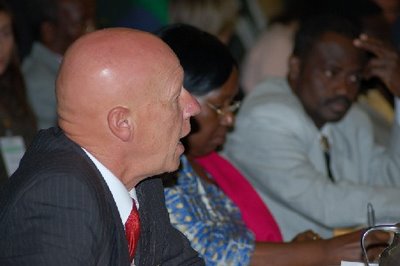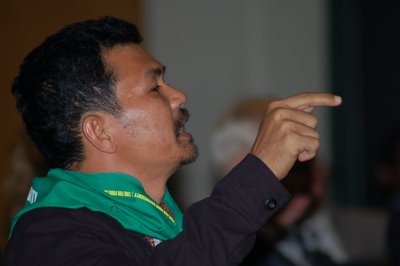“I am not optimistic about the prospects of reducing hunger in the world until you bring the farmers into the conversation.”
 With these words Jack Wilkinson, a farmer from northern
With these words Jack Wilkinson, a farmer from northern
I am forever amazed at the way in which we, as a world community, come together to talk. In a time where violence continues to be used as a mechanism to resolve “problems” our ability to sit down around a table together should not be taken for granted. At the United Nations, this dialogue is almost always between, and among country delegations. In the case of the meetings this week, these delegations are largely made up of civil servants. Our Canadian delegation is made up of officials from the federal departments of Agriculture, Foreign Affairs and the Canadian International Development Agency. Not a single elected world leader was in attendance.
However, despite the absence of the elected officials, some very positive changes in process emerged at the meetings today. For the first time the table was broadened, and some chairs were brought around to allow international non-governmental organizations, indigenous peoples, farmers’ organizations and social movements from around the world to fully participate in the sessions. This is interesting because these are the people with dirt under their fingernails and who are closest to the real work of ending hunger. They are the small-scale farmers who are growing the food and whose livelihoods are directly linked to the discussions. They are also the people involved in creating spaces for farmers to learn from one another, as well as the citizens who are challenging their governments to create policies that support sustainable food systems that ensure all people can realize their human right to food. In their statement from the floor, Switzerland used a part of their 5 minutes at the microphone to commend the organizers for including civil society in the conversation.
Like an extended dinner table, the conversation is more vibrant and interesting when there is a diversity of voices. Despite a chairperson who struggled to include all of the voices, and the resulting brief walkout of a frustrated group of small-scale farmers representing La Via Campesina, the roots of a real conversation are growing. It will take great care to ensure it continues.

After a long wait Henry Saragalin, and Indonesian farmer and member of Via Campesina addresses the assembly
It is a fascinating dynamic that is unfolding. When faced with the rising number of hungry people, elected leaders seem to have pulled back from the task at hand, and civil society has stepped forward to engage in the dialogue about solutions on an equal footing. The emerging common ground from all who are gathered here today is that people and governments need to engage more seriously in the work of creating policies around food and agriculture that will allow everyone to have enough to eat. Strangely, governments have not shown a great interest, or capacity to engage their citizens in this kind of dialogue. While I am excited to see a broader range of voices participating in these meetings, I am left troubled by the disappearing voice of elected governments. It appears that there is space opening for organizations like the Canadian Foodgrains Bank to engage Canadians in challenging our government to take a more active role. In fact, we have already started.
Check the Food Justice page for more information on how you can participate in ending hunger.
Kenton Lobe
At 11:17 AM,
At 9:20 PM,
Kenton, Thank you for highlighting the role that small farmers and other local people should be playing in decision making processes that so dramatically shape their lives. I can imagine how difficult it was for the “regulars” at the meeting to adapt to the presence of people with dirt under their fingernails - and vise versa. This is indeed hard work for everyone. If the regulars and the newbie’s at the international table figure out how to dine civilly together, ending hunger has a fighting chance.

Are there other absent voices?
-Thanks again for the updates.